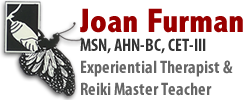What is Holistic Nursing?
Holistic Nursing is a discipline that integrates modern health care with powerful self-help treatments to strengthen the natural healing capacities of the mind, body, and spirit. It is based on an academic nursing background, a sensitive balance between art and science, analytical and intuitive skills, and the opportunity to choose from a wide variety of modalities to promote healing and the harmonious balance of human energy systems.
Holistic nursing works with the causes of poor health, which are multi-dimensional, involving the interaction among physical, psychological, social, spiritual, and environmental factors. It recognizes that all persons have the potential for growth and progression toward wholeness and of being their own healer; that all persons have the right of self determination thereby assuming the primary responsibility in guiding, directing, and controlling their own health, disease, and illness.
Holistic nurse practitioners assist people in assuming personal responsibility for their health and to learn from disease and distress as opportunities for increased awareness of the interconnectedness of body, mind, and spirit.
What is Holistic Counseling?
Holistic counseling, tailored to your concerns, promotes self healing and a genuine sense of aliveness by exploring the opportunities to create the life you really want. In emotional healing, we explore blockages to your happiness and fulfillment. If you have physical illness, we find ways to use your mind and emotions to assist you in healing. While this approach does not promote "mind over matter," it does value the powerful roles of the mind and emotion in healing. Holistic counseling includes addressing personal growth issues or physical health concerns with this definition of health in mind.
I have a history of childhood trauma. What additional therapies do you use for treatment of trauma?
Experiential Therapy has been growing steadily in popularity because of its unique effectiveness and efficiency. It is a role play method through which past, present and future issues can be resolved and when combined with more traditional modalities serves to elicit material from the unconscious that allows one to fill in perceptual, cognitive and emotional gaps. Material that has been out-of-vision can come to the surface where it can be worked through and seen in a new light. Its unique ability to give voice to hidden wounds has made the experiential model a therapy of choice for treatment centers and hospitals across the United States. For more information, go to www.asetonline.com.
EMDR or Eye Movement Desensitization and Reprocessing
Eye Movement Desensitization and Reprocessing (EMDR)1 is a comprehensive, integrative psychotherapy approach. It contains elements of many effective psychotherapies in structured protocols that are designed to maximize treatment effects. These include psychodynamic, cognitive behavioral, interpersonal, experiential, and body-centered therapies2.
EMDR is an information processing therapy and uses an eight phase approach to address the experiential contributors of a wide range of pathologies. It attends to the past experiences that have set the groundwork for pathology, the current situations that trigger dysfunctional emotions, beliefs and sensations, and the positive experience needed to enhance future adaptive behaviors and mental health.
During treatment various procedures and protocols are used to address the entire clinical picture. One of the procedural elements is "dual stimulation" using either bilateral eye movements, tones or taps. During the reprocessing phases the client attends momentarily to past memories, present triggers, or anticipated future experiences while simultaneously focusing on a set of external stimulus. During that time, clients generally experience the emergence of insight, changes in memories, or new associations. The clinician assists the client to focus on appropriate material before initiation of each subsequent set. For more information, go to www.emdr.com
What is an Experiential Therapy Group?
Click here to jump to the Experiential Therapy Group page.
How do you define health?
welcoming responsibility for your life
having choices and making decisions
loving ourselves and others and being loved
healing
an aliveness with love, trust, expectancy and enthusiasm with which we live our lives
living a relationship with our spirituality
seeking the highest truth
learning to have fun and consciously creating success
What is the difference between Reiki and Healing Touch?
Reiki comes from an ancient tradition, originating in Tibet and was rediscovered in the mid 1800's by Dr. Mikao Usui, who was the Dean of a small Christian university in Kyoto, Japan. It, like healing touch, uses energy for healing and is primarily given to the recipient through light touch. Reiki is taught by a Reiki Master Therapist/Teacher and should be studied and practiced over a period of time determined by the Reiki Master. Healing Touch is a program of study founded by Janet Mentgen, RN and endorsed by the American HNA. Rather than a technique, it is a series of touch techniques, again using energy and the hands of the "healer." The healing touch therapies, like Reiki, are painless and pleasant and may be used to reduce or alleviate pain, promote healing of both mind and body, reduce anxiety, and assist the recipient in personal growth.
Do you teach Reiki and healing touch?
I am a Reiki Master Therapist/Teacher in traditional Reiki, the oldest and purest form of Reiki. I do teach Reiki to anyone who is interested (Click here for the schedule). Although I practice healing touch I do not teach the course, though I do teach therapeutic touch (one of the healing touch therapies) to interested groups.
How long does it take to learn Reiki?
In eastern traditions, one does not rush, but learns by doing. Although First Degree Reiki is taught in a two day weekend class, and you will be able to both give a treatment to another and to yourself by the end of the weekend, you will be come a practiced Reiki practitioner over time. I prefer to wait a month before a person takes Second Degree Reiki so that the student really gets to "know" the feel of First Degree Reiki energy. Second degree Reiki is taught in one day, but includes learning the "keys" of Reiki, and again requires practice time. In the tradition, to become a Reiki Master Therapist, one works with the Reiki Master for 21 sessions of receiving Third Degree Reiki and through this process, much personal growth is done. It is in the time spent in the process that one becomes a Reiki Master. To become a Reiki Master Teacher, one continues studying with the Reiki Master to learn how to teach, how to attune students and how to "live" Reiki, which by this time has become a way of life.
If I come to you for counseling, do you change the medications prescribed to me by my doctor?
No, absolutely not. I have a cooperative relationship with physicians and the therapies I offer only enhance their work. I do not prescribe medications in my practice.
I am scheduled for surgery and I am scared. What can you do for me?
First I would get to know you a bit to decide together what would be most helpful to you. We may work on ways to enhance your chances for good results, such as nutritional support, exercise, vitamins and supplements, but would also look at ways to reduce your anxiety. I make audiotapes to take into the operating room so that you can listen to me giving suggestions about your positive recovery and good outcome, followed by another audiotape for management of post operative pain and other symptoms. In the day or so following surgery, if you want, I can visit you to see if your symptoms are being managed well,and do some Reiki to assist your body in recovery from the surgery as well as the anesthesia.
What kinds of services to you offer for someone who is dying?
First, my book, The Dying Time: Practical Wisdom for the Dying and Their Caregivers (Crown, 1997) is very helpful to the dying and to their families and friends during this difficult and painful time. I wrote this book after 30 years of experience in caring for the dying and believe that it answers most questions about how to do this well. In my practice I support the dying person in whatever choices they are making and help the family in terms of counseling and planning. I provide touch therapies to help with symptoms, guided imagery and many other alternative healing methods described in the chapter named "A Healing Environment."
Does insurance cover your services?
Rarely. My clients pay out of pocket for services.
What does it take to become a holistic nurse practitioner?
I have a masters degree (MSN) in nursing and have been a nurse and later a nurse practitioner for 30 years. I also completed the post-graduate Certificate Program in Holistic Nursing and I am nationally certified as an Advanced Practice Holistic Nurse Practitioner.
How can I find out more about holistic nursing?
Call the national office of American Holistic Nurses Association at 1-800-278-AHNA.
How do I make an appointment with you?
Please call me at 615-500-6998, or if you would like me to contact you please click here.

